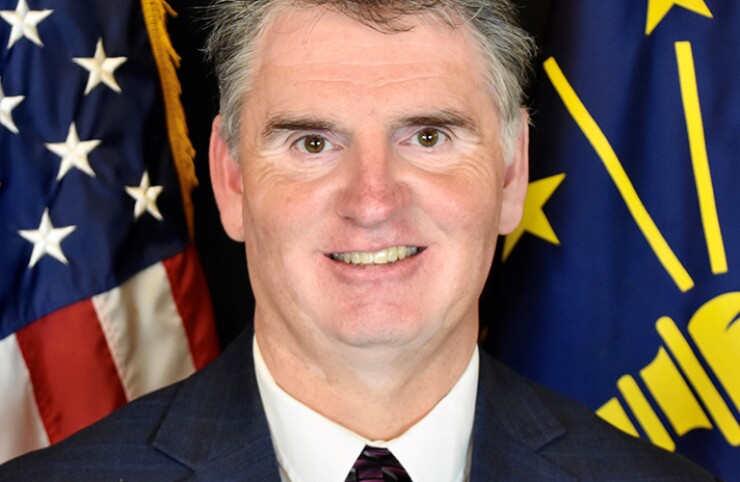
The battle over ESG investing is spreading in the Midwest, with the recent passage of an Ohio law barring state pension funds from investing based on environmental, social and governance factors and a Dec. 13 decision by the Indiana Public Retirement System (INPRS) to dismiss BlackRock from managing its assets due to concerns over the firm's ESG commitments.
"We've seen this in other states," said Jeff Eller, spokesman for the Alliance for Prosperity & a Secure Retirement, a Delaware-based nonprofit that advocates policies that expand access to retirement solutions. "
Eller said if the INPRS board stops prioritizing low fees and effective asset management — both of which INPRS staff reportedly acknowledged BlackRock had provided,
Such battles are more entrenched in the Southwest, where
The Texas attorney general this month ended a review of Wells Fargo that had called into question its ability to underwrite governmental bonds in the state
Meanwhile, Oklahoma's attorney general announced earlier this month that he is appealing a state district court's ruling against
A federal judge
More than two dozen other anti-ESG bills proposed in the last two years in Illinois, Indiana, Iowa, Minnesota, Nebraska and North Dakota are all now dead, according to the Anti-ESG Bill Tracker.
Michigan's HB 4344, HB 4381 and HB 5310 are all currently in committee. They would ban state contracts with entities engaged in economic boycotts; ban the consideration of social, political or ideological goals by the public employee retirement system asset manager; and ban state contracts with financial institutions that boycott firearms dealers and manufacturers, fossil fuel producers, agriculture or timber companies, respectively.
"Across the country, many states are pushing back against ESG investing," Abhilash Reddy, chief of staff for Indiana State Treasurer Daniel Elliott, told The Bond Buyer. "Treasurer Elliott is a leader in that fight and draws inspiration from his fellow financial officers while providing an example of how to fight for his state's public servants."
The INPRS board of trustees unanimously relieved BlackRock of its asset management duties after the state treasurer and the secretary of state both publicly criticized the firm for its commitment to ESG principles.
Reddy said the treasurer has a duty under state law to examine asset managers "and report to the INPRS board whether they've violated the state provisions on ESG within Indiana's pension system."
The
Reddy added, "There are a multitude of studies and articles that the treasurer would cite that question the effectiveness of ESG investing and the rating system used to guide ESG investing. These sources include the Harvard Business Review and Bloomberg."
Elliott told
Elliott accused BlackRock of investing the pension system's assets "based on their political views, rather than ... what's the best rate of return" on investment.
"You have these woke corporations who are dictating how people should invest," he said. "You have these folks from New York City and Europe and California dictating how Hoosiers' investments should be invested. And that's a problem."
"We're proud of having helped hundreds of thousands of Indianans invest and retire with dignity," BlackRock said in a statement after the vote. "Despite this decision, we remain committed to Indiana and the $102 billion we have invested in the state on behalf of our clients."
According to the
BlackRock argued in a statement then that it would never make commitments that constrained its ability to invest its clients' money as they wished.
"[This] action by Mr. Morales is a politically motivated attack that completely mischaracterizes BlackRock's approach to investing," the firm said. "We are only focused on helping hundreds of thousands of Hoosier clients achieve their investment goals. We intend to defend ourselves and our clients against this arbitrary use of state power."
Indiana State Comptroller Elise Nieshalla, who voted with Elliott to terminate BlackRock's role and pursue an alternative asset manager,
The Alliance's Eller noted, INPRS testified in 2023 that it did not invest according to ESG principles and had updated its policies to emphasize fiduciary duty and maximizing returns.
He also pointed to a comment made by Cris Johnston, then-Governor Eric Holcomb's budget director, during the INPRS board meeting: "It seems like the law is not allowing INPRS to live up to the spirit of its fiduciary responsibility."
In Ohio,
The
The bill's primary sponsor, state Sen. Kirk Schuring, passed away earlier this year. His colleague Sen. Jerry Cirino, R-Kirtland, who testified in favor of the legislation, did not respond to a request for comment by press time.
His colleague Sen. Jerry Cirino, R-Kirtland, who testified in favor of the law, said the legislation dates back to last year, when "ESG investing was really pretty popular.
"The issue for us was really the pension plans in the state of Ohio," he added. "We already had rules about requiring investments to be made with the sole purpose of creating the best rate of return… because we have obligations to current and future retirees. ... This was to reinforce the law, so that the only criteria that can be used is the criteria of, what is the best return?"
Cirino said the Midwest's large population of retirees, as well as its increasingly red political tint, mean that the region is more skeptical of ESG investing than the coasts.
"We want to protect those assets as best we can," he said.
Gov. Mike DeWine





